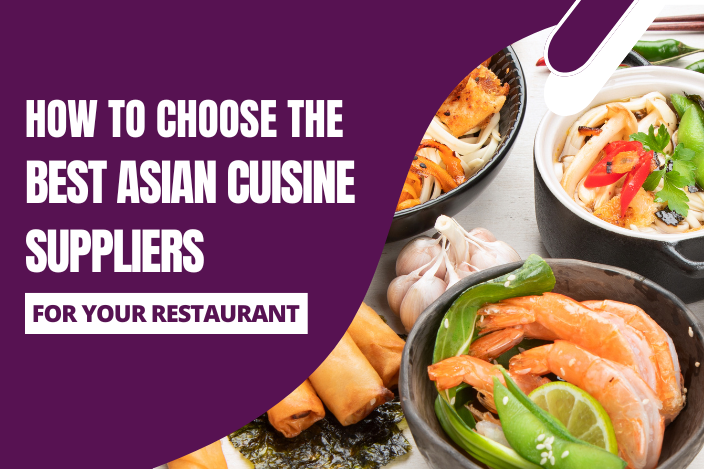Selecting the right suppliers is crucial for any restaurant aiming to deliver authentic and high-quality Asian cuisine. The quality of ingredients directly impacts the taste and reputation of your dishes. Therefore, partnering with reliable suppliers ensures consistency, authenticity, and customer satisfaction.
Understanding Your Restaurant’s Needs
Before embarking on the search for suppliers, it's essential to clearly define your restaurant's specific requirements:
Cuisine Focus: Identify whether your menu specialises in Chinese, Japanese, Thai, Indian, or a fusion of Asian cuisines. This focus will determine the types of ingredients you'll need.
Volume Requirements: Assess the quantity of ingredients required on a daily, weekly, and monthly basis to ensure potential suppliers can meet your demand.
Specialty Items: Determine if your menu includes unique or hard-to-find ingredients that may necessitate sourcing from specialised suppliers.
Types of Asian Cuisine Suppliers
Understanding the various types of suppliers can help you make informed decisions:
Local Wholesalers: These suppliers offer a range of products and can provide quick replenishment. For instance, Jk is one of the UK's leading importers and distributors of oriental foods, sourcing products from countries like the Philippines, Thailand, Singapore, China, Malaysia, and India.
Direct Importers: Companies that import products directly from Asian countries can offer authentic ingredients. JK Foods is a notable example, being the UK's largest oriental food wholesaler and distributor.
Online Distributors: Platforms like JK provide a vast selection of Asian products available for bulk purchase, offering convenience and a wide range.
Specialty Markets: Niche suppliers focus on specific cuisines or product types, offering unique ingredients that might not be available elsewhere. Tiger Tiger Foods is a UK-based developer of Asian food products, providing a diverse selection spanning Japanese, Thai, Chinese, and Indian cuisines.
Evaluating Supplier Quality
Ensuring the quality of ingredients is paramount:
Product Freshness: Verify that suppliers maintain stringent quality checks to ensure freshness. For example, JK Foods emphasises quality assurance by subjecting every product to rigorous quality checks to meet high standards of freshness, taste, and safety.
Storage and Handling: Ensure suppliers adhere to proper storage and handling protocols to maintain product integrity.
Certifications: Look for suppliers with relevant certifications, such as ISO or HACCP, indicating compliance with international food safety standards.
Pricing and Cost Considerations
Balancing quality with cost is essential:
Competitive Pricing: Compare prices among suppliers to ensure you're getting value for money without compromising on quality. Tiger Tiger Foods prides itself on offering exceptional quality at competitive prices.
Bulk Discounts: Some suppliers offer discounts for large orders, which can be beneficial for high-volume restaurants.
Additional Costs: Be aware of potential extra charges, such as delivery fees or minimum order requirements.
Sourcing Authentic Ingredients
Authenticity is key in Asian cuisine:
Supplier Transparency: Choose suppliers who are open about their sourcing practices. JK Foods is committed to sourcing the highest quality oriental ingredients from renowned suppliers throughout Asia, ensuring authenticity.
Product Origin: Ensure products are sourced from their native regions to maintain traditional flavours.
Authenticity Certifications: Look for products with authenticity seals or certifications, indicating genuine sourcing.
Verifying Supplier Reputation
A supplier's reputation can provide insight into their reliability:
Customer Reviews: Check testimonials and reviews from other businesses to gauge satisfaction levels.
Industry Standing: Suppliers with a long-standing presence in the industry, like jk foods often have established trust and reliability.
References: Don't hesitate to ask suppliers for references from existing clients.
Supplier Reliability and Consistency
Consistency is crucial for maintaining menu quality:
Delivery Timeliness: Ensure suppliers have a track record of punctual deliveries.
Contingency Plans: Reliable suppliers should have measures in place to handle unforeseen disruptions.
Communication: Open and proactive communication is vital for addressing potential issues promptly.
Building Long-Term Supplier Relationships
Fostering strong relationships can lead to mutual benefits:
Negotiated Terms: Long-term partnerships can result in better pricing and priority service.
Regular Feedback: Providing constructive feedback helps suppliers align with your expectations.
Collaborative Planning: Working together on forecasts and promotions can enhance business outcomes.
Compliance with Food Safety Regulations
Adherence to regulations ensures safety and legality:
Regulatory Compliance: Verify that suppliers comply with local and international food safety standards.
Regular Audits: Conduct periodic inspections or request audit reports to ensure ongoing compliance.
Documentation: Maintain thorough records of supplier certifications and compliance documents.
Exploring Sustainable and Ethical Sourcing
Sustainability is increasingly important to consumers:
Eco-Friendly Practices: Partner with suppliers who prioritise sustainable sourcing and packaging.
Ethical Standards: Ensure suppliers engage in fair trade and ethical labour practices.
Corporate Social Responsibility: Suppliers with CSR initiatives often demonstrate a commitment to broader societal values.
Comparing Local vs. International Suppliers
Each has its advantages:
Local Suppliers: Offer faster delivery times and support the local economy.
International Suppliers: Provide access to a broader range of authentic products.
Hybrid Approach: Combining both can offer flexibility and a diverse product range.
Technology and Supplier Management Tools
Leveraging technology can streamline operations:
Inventory Management Systems: Tools that track stock levels and predict ordering needs can enhance efficiency.
Supplier Portals: Digital platforms facilitate seamless communication and order management.
Data Analytics: Analysing purchasing patterns can lead to more informed decision-making.
Negotiation Strategies for Better Deals
Effective negotiation can improve profitability:
Market Research: Understand current market rates to negotiate competitively.
Volume Leverage: Use bulk purchasing as a bargaining tool for discounts.
Flexible Terms: Negotiate payment terms that align with your cash flow.
FAQs About Choosing Asian Cuisine Suppliers
1. What are the best Asian food suppliers for restaurants in the UK?
Several reputable suppliers include JK Foods and Tiger Tiger Foods.
2. How can I ensure ingredient authenticity?
Partner with suppliers who source directly from native regions and provide transparency about their sourcing practices.
3. What certifications should I check for in a supplier?
Look for certifications such as ISO, HACCP, and other relevant food safety and quality standards.
4. How do I manage supplier delivery issues?
Establish clear communication channels and have contingency plans in place for unforeseen disruptions

